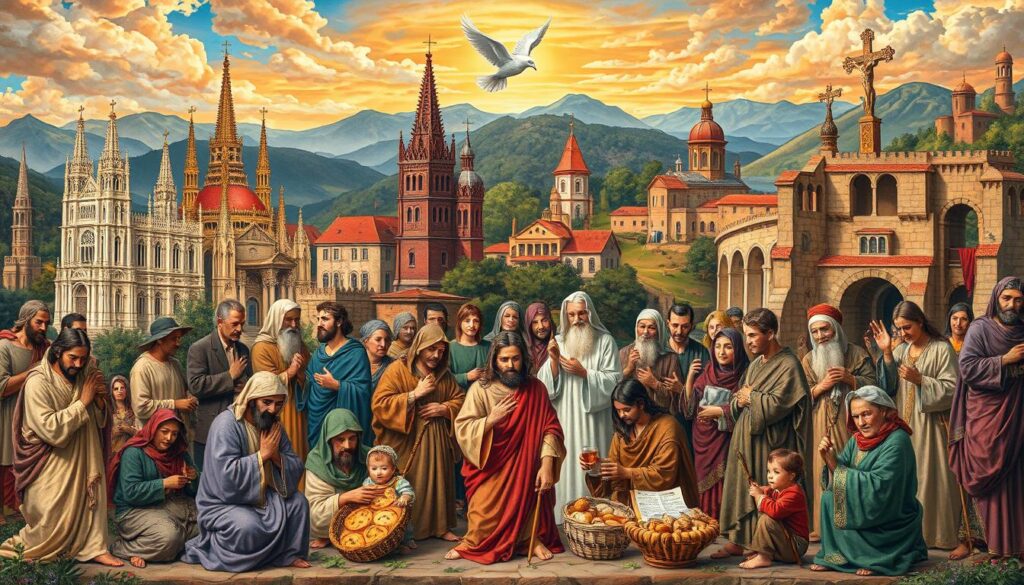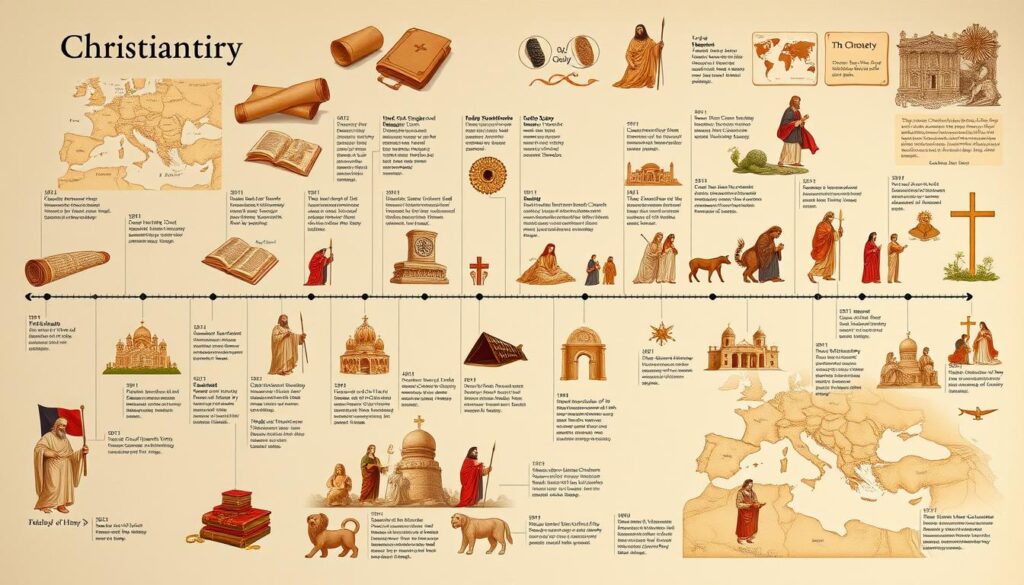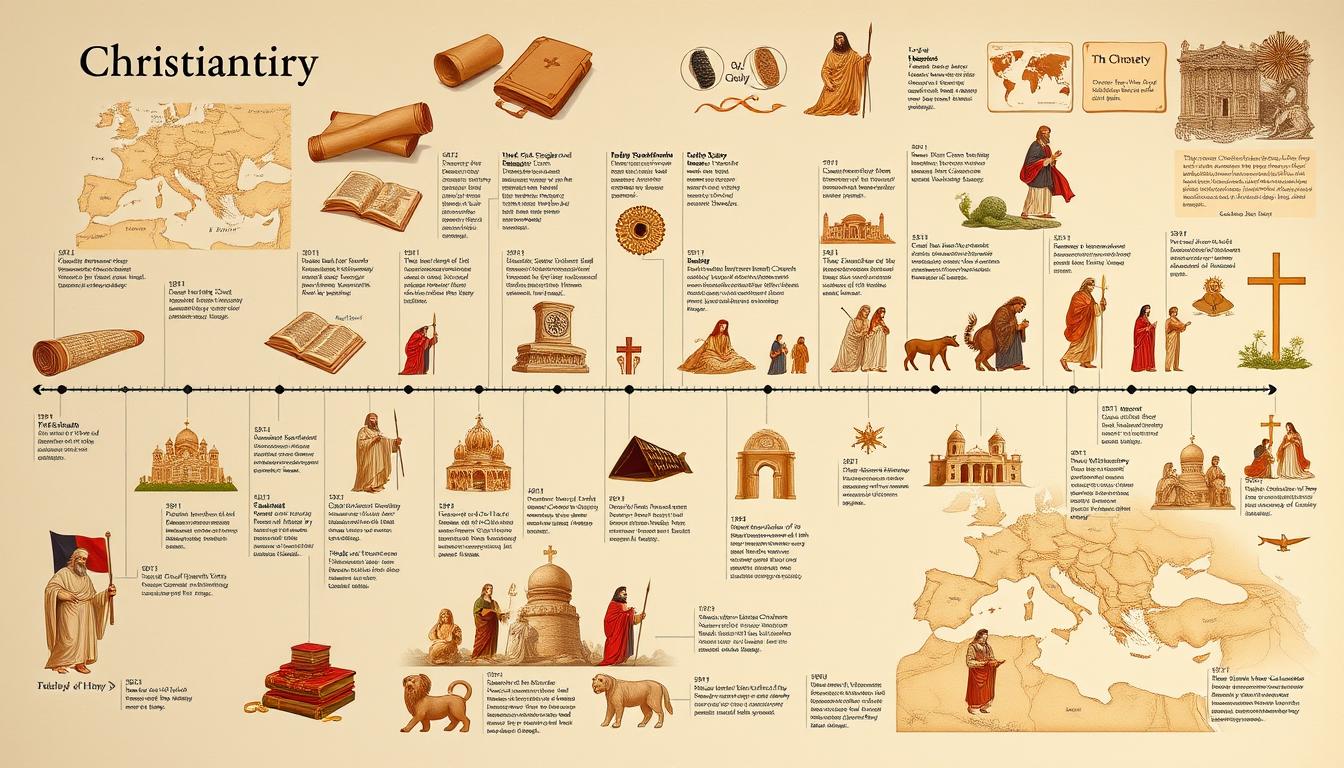Exploring Christianity, I find many interesting facts. It has over 2.4 billion followers, making it the top religion. It covers about 31.2% of the world’s people. Started in the 1st century CE, its history is filled with rich beliefs and practices.
Interesting Facts About Christianity Religion!
Welcome to checkreligion.com
At the heart of Christianity are the teachings of one God and the Bible. The Bible is the most translated book, in over 3,000 languages. It has 66 books, split into the Old and New Testaments. Millions of copies are sold each year.
This shows Christianity’s big impact on culture and society. Let’s dive into the many sides of this lively faith.
Key Takeaways
- Over 2.4 billion people worldwide identify as Christians.
- Christianity accounts for approximately 31.2% of the global population.
- The Bible is the most translated book, found in more than 3,000 languages.
- Christianity has diverse beliefs and practices across various denominations.
- In Latin America, there is the largest Christian following globally.
- Christianity began in the 1st century CE with Jesus Christ’s life and teachings.
- Jesus emphasized love and forgiveness as core messages of the faith.

The Origins of Christianity
Exploring Christianity’s start, we see a mix of historical context and faith. It began when Judaism was strong. Followers saw Jesus as the Messiah, leading to a new faith.
Historical Context
The Roman Empire’s power and the era’s tensions shaped Christianity. Jesus started his work at 30 in Galilee. He had twelve disciples and did miracles like raising the dead.
This changed the religious scene. The New Testament was written between A.D. 70 and 100. It includes key letters from early leaders, shaping doctrine and identity.
Judeo-Christian Roots
Christianity’s Judeo-Christian roots show in its monotheism. It sees God as a Trinity: Father, Son, and Holy Spirit. This ties back to Judaism’s role in shaping Christian beliefs.
The first Christian meetings started 50 days after Jesus died. This was a key moment in Christianity’s history.
| Year | Event |
|---|---|
| 2 B.C. – 7 B.C. | Jesus’ birth |
| A.D. 30 | Beginning of Jesus’ public ministry |
| A.D. 64 | Emperor Nero blames Christians for the fire in Rome |
| A.D. 313 | Constantine lifts the ban on Christianity |
| A.D. 380 | Emperor Theodosius I declares Catholicism the state religion |
| A.D. 1054 | Split between Catholic Church and Eastern Orthodox Church |
| A.D. 1517 | Start of the Reformation |
Key Figures in Christianity

In Christianity, some figures really stand out. Jesus Christ is at the heart of it all. The Apostle Paul also played a big role in spreading the faith.
Jesus Christ: The Central Figure
Jesus Christ is more than a name. He is the heart of Christianity. He taught about love, forgiveness, and salvation.
His life, teachings, death, and coming back to life are key moments. They bring hope and the promise of eternal life. Jesus’s teachings have shaped our morals and values for centuries.
The Apostle Paul and His Influence
The Apostle Paul is another key figure. He went from being against Christians to being a strong supporter. His work helped spread Christianity far and wide.
Through his letters, Paul helped early Christian groups. He shared important teachings and advice. His writings helped shape what Christians believe today.
| Figure | Role | Impact |
|---|---|---|
| Jesus Christ | Central figure of Christianity | Established core teachings and principles. |
| Apostle Paul | Early Christian missionary | Expanded Christianity’s reach and authored significant theological texts. |
Interesting Facts About Christianity Religion
Christianity is the biggest religion in the world. About 31.2% of people globally are Christians, says Pew Research. In the U.S., 65% of adults say they are Christians. This shows how big and important Christianity is in American life.
The Largest Religion in the World
Christianity has over 2 billion followers. It has many beliefs and practices. It has changed a lot over time, like when it became the Roman Empire’s official religion in 392 AD.
Big splits happened, like in 1054 between the Roman Catholic and Eastern Orthodox Churches. Also, Martin Luther started Protestantism in 1517.
Impact on Global Culture and Society
Christianity has touched many areas of life. It has influenced art, literature, education, and healthcare. Its teachings on ethics have shaped Western ideas of right and wrong.
Art from the Renaissance often used biblical stories. Schools and hospitals started because of Christian values. They help people in need.
| Statistic | Percentage |
|---|---|
| Christianity’s Share of World Religions (2015) | 31.2% |
| Adults Identifying as Christians in the U.S. (2019) | 65% |
| Protestant | 43% |
| Roman Catholic | 20% |
| Unaffiliated (Including Atheists and Agnostics) | 26% |
| Mormon | 2% |
| Other Religions (Jewish, Muslim, Buddhist) | 4% Combined |

Christianity Beliefs and Core Teachings
Christianity is based on believing in one God. This belief is called monotheism. It also believes in God as a Trinity: God the Father, God the Son (Jesus), and God the Holy Spirit.
Monotheism and the Nature of God
Christianity teaches a deep bond between God and people. It’s different because it believes in one God. This faith encourages followers to connect with their creator.
It has texts like the Old and New Testaments. These guide the faith. The Ten Commandments are key for living right.
Salvation through Jesus Christ
Salvation is very important in Christianity. It comes through faith in Jesus Christ. His life, death, and resurrection help believers connect with God.
This faith is about grace and saying sorry. About 47% of Christians see Jesus as God in human form. They believe in his divinity and humanity.
| Aspect | Details |
|---|---|
| Followers | Over 2 billion globally |
| Branches | Orthodox, Protestant, Roman Catholic |
| Gospels | 33% focus on Jesus’ conception and birth |
| Divine Nature | 62% believe Jesus is fully God and fully human |
| Central Message | Love God and love your neighbor |
| Trinity | God the Father, Son, Holy Spirit |
Christianity’s Diverse Denominations
Christianity has many denominations, each with its own beliefs and practices. Knowing about these groups helps us see how wide and varied the faith is. Major denominations include Roman Catholicism, Eastern Orthodoxy, and Protestantism.
Each group has its own way of understanding the Bible. This leads to different ways of worship and beliefs.
Overview of Major Denominations
Every denomination has its own special way of believing and living together. Here’s a look at some of the biggest ones:
| Denomination | Global Adherents | Percentage of Total Christians |
|---|---|---|
| Catholic Church | 1.3 billion | 50.1% |
| Protestant Churches | Approximately 1.047 billion | 39.8% |
| Eastern Orthodox Church | 230 million | 11.9% |
These three big groups make up most of the world’s Christians. They have their own traditions, rituals, and ways of understanding the Bible. In the Northern Territory of Australia, for example, the biggest groups are Roman Catholicism, Anglicanism, and the Uniting Church.
The Significance of Denominational Differences
Denominational differences are more than just different ways of worship. They affect what people believe and how they live together. For example, how people celebrate Lent can vary a lot.
Some focus on fasting and thinking deeply, while others do community service or special church services. The main differences are in:
- How they understand the Bible
- How they worship and the music they use
- How they work together and help others
- What they believe about special church practices
Even with these differences, all Christians share the same basic beliefs. Each group helps show how faith can be expressed in many ways. This makes the Christian community all around the world rich and varied.
Christianity Traditions and Practices
Christianity traditions are very important. They shape how believers live and grow. Many practices unite people and help them grow spiritually.
Common Practices in Different Denominations
Christian practices vary a lot. This shows the faith’s rich diversity. Here are some common practices:
- Prayer – A key way to connect with God.
- Bible Study – Deepens understanding and faith.
- Communal Worship – Brings people together in shared belief.
- Baptism – Marks a big step in faith.
- Communion – Remembers Christ’s Last Supper.
Importance of Rituals in Worship
Rituals in worship are very important. They help believers connect with God. These include:
| Ritual | Denomination | Significance |
|---|---|---|
| Baptism | All major denominations | Entrance into the Christian community |
| Communion | Catholic, Anglican, Lutheran | Spiritual nourishment and remembrance of Christ’s sacrifice |
| Confirmation | Catholic, Anglican | Affirmation of faith and commitment to the church |
| Liturgical Seasons | All denominations | Marking the calendar helps to reflect on the life of Christ |
Christianity traditions and rituals are key. They build community, identity, and spiritual growth. Through these practices, my faith journey is richer and deeper.
Christianity’s Rich Symbolism
Christianity is full of symbols with deep meanings. The cross is a key symbol of sacrifice and redemption. Each symbol connects believers to their faith’s roots.
The Cross: A Central Symbol
The cross is more than a picture. It shows Jesus’ sacrifice. Its shape, like the letter T, became important by the 2nd century.
Early Christians marked their foreheads with the cross in the 3rd century. This act is a cherished tradition today.
Other Significant Symbols in Christianity
Christianity has many symbols. The fish, or Ichthys, was an early symbol for Christ. It was a secret sign for believers.
The Alpha and Omega, meaning the start and end, appeared in early Christian art. The dove represents the Holy Spirit and peace. The Bible is God’s word and teachings.
These symbols are found in church art and personal faith expressions. They make the spiritual journey of Christians richer.
| Symbol | Meaning | Historical Significance |
|---|---|---|
| The Cross | Represents sacrifice and redemption | Central symbol in Christianity since the 2nd century |
| Ichthys (Fish) | Symbolizes Christ and believers | Used as a secret symbol among early Christians |
| The Dove | Represents peace and the Holy Spirit | Emphasizes God’s presence in the world |
| Alpha and Omega | Denotes the beginning and the end | Found in early Christian catacomb art |
| The Bible | Reflects God’s word and teachings | Best-selling book of all time with over 5 billion copies |
Christianity’s Major Holidays
Easter is the biggest holiday in the Christian calendar. It celebrates Jesus Christ’s resurrection. This event is three days after His death, a key moment in Christian belief.
Easter means victory over sin and death. It brings hope and renewal. Before Easter, there’s Lent, a time for fasting and thinking.
Easter: Celebration of Resurrection
Worldwide, Easter is celebrated in many ways. Some fast and don’t eat meat on Good Friday. Maundy Thursday remembers the Last Supper and the Eucharist.
Easter is more than one day. It includes sunrise services and family meals. Unique traditions make Easter special, showing the diversity of Christianity.
Other big holidays are important too. The Orthodox Christmas Fast is 40 days long. Las Posadas is a nine-day event before Christmas. These holidays show the richness of Christian tradition and faith.
| Holiday | Key Practices | Duration |
|---|---|---|
| Easter | Fasting, Sunrise Services, Family Meals | 1 day (with a period of Lent leading up) |
| Good Friday | Fasting, Abstaining from Meat | 1 day |
| Maundy Thursday | Last Supper Commemoration, Eucharist | 1 day |
| Orthodox Christmas Fast | Fasting, Prayer | 40 days |
| Las Posadas | Reenactment of Journey to Bethlehem | 9 days |
These holidays help people grow in faith and connect with others. They remind us of our shared values and traditions in Christianity.
Christianity’s Teachings on Ethics and Morality
Christian teachings give deep insights into ethics and morality. They shape how believers act in the world. Love and forgiveness are key, guiding personal actions and community life.
Love and Forgiveness
Jesus taught love in the Sermon on the Mount. He said to love neighbors and even enemies. This idea changes how we handle conflicts.
Love and forgiveness help relationships grow. They help us heal and grow spiritually. Forgiving others frees us from anger and resentment.
Human Dignity and Worth
Christian ethics focus on human dignity and worth. Every person is seen as made in God’s image. This means they deserve respect and kindness.
This belief drives support for human rights and helping those in need. Christianity teaches justice and service. It shows the value of every person in life.
The Influence of Christianity on Western Civilization
Christianity has shaped Western civilization a lot. It has helped in law, art, and literature. These areas show what society values and how it changes.
Christianity and the Development of Law
Christianity has shaped our laws today. It brought the idea of one truth for all. This idea helps keep justice fair and protects the weak.
Without this idea, laws could be based on who is in power. This could lead to chaos in how laws are made.
- Rule of Law: Christian teachings say God is above all, guiding laws for everyone.
- Moral Standards: Believing in a higher authority led to laws against murder and valuing human life.
- Individualism: Christianity made people see themselves as individuals, not just part of a group.
Impact on Art and Literature
Christian themes have greatly influenced art and literature. Works like Michelangelo’s Sistine Chapel and Dante’s Divine Comedy show this. They bring out religious ideas and are key to Western culture.
| Art/Literature | Artist/Author | Christian Theme |
|---|---|---|
| Sistine Chapel | Michelangelo | Creation and the Divine |
| The Divine Comedy | Dante Alighieri | Journey of the Soul |
| Hamlet | William Shakespeare | Morality and Redemption |
Christianity and art have a lasting connection. These works carry messages of faith and society’s values. They help shape our world.
Conclusion
Exploring Christianity shows a rich mix of beliefs, practices, and history. It shapes lives worldwide. From Jesus Christ’s teachings to today’s diverse faith, it’s alive.
Christianity is about love, forgiveness, and redemption. These values touch the hearts of many. They help believers connect with their communities.
With over 2 billion followers, Christianity is the biggest religion. It spans many cultures and traditions. Denominations like the Roman Catholic Church add to its richness.
Women supported Jesus, and the early Church was complex. Today, the search for truth continues. This shows Christianity’s depth and growth.
Thinking about Christianity, I see a faith that invites us to explore. It has shaped history and still does today. Understanding Christianity gives us insights into humanity.
FAQ
What are some interesting facts about Christianity as a religion?
Christianity is the biggest religion worldwide. It has over 2 billion followers. This makes up about 31.6% of the world’s population as of 2022. It started in the 1st century CE and is based on Jesus Christ’s life and teachings.
Who is considered the central figure in Christianity?
Jesus Christ is the heart of Christianity. He is seen as the Son of God. His teachings are about love, forgiveness, and salvation. He is believed to be the Messiah.
What are some common rituals and practices in Christianity?
Christians often pray, study the Bible, and go to church together. Baptism and communion are key rituals. They show faith and bring believers together.
What is the significance of the Cross in Christianity?
The Cross is a big symbol in Christianity. It shows Christ’s sacrifice and the promise of salvation. It represents his crucifixion and resurrection.
How do different denominations interpret Christian teachings?
Christianity has thousands of denominations. Each has its own beliefs and practices. Big ones include Roman Catholicism, Eastern Orthodoxy, and Protestantism. They differ in worship and beliefs.
What are the major holidays celebrated in Christianity?
Christians celebrate Easter, which is about Jesus’s resurrection. They also celebrate Christmas, his birth. And Pentecost, when the Holy Spirit came to the apostles.
What are some key ethical teachings in Christianity?
Christianity teaches love and forgiveness as key morals. Jesus said loving your neighbor and even enemies is very important. This affects how we live and treat others.
In what ways has Christianity influenced Western civilization?
Christianity has shaped law and ethics in the West. It has influenced justice and mercy. It has also inspired art and literature, adding religious themes to Western culture.

